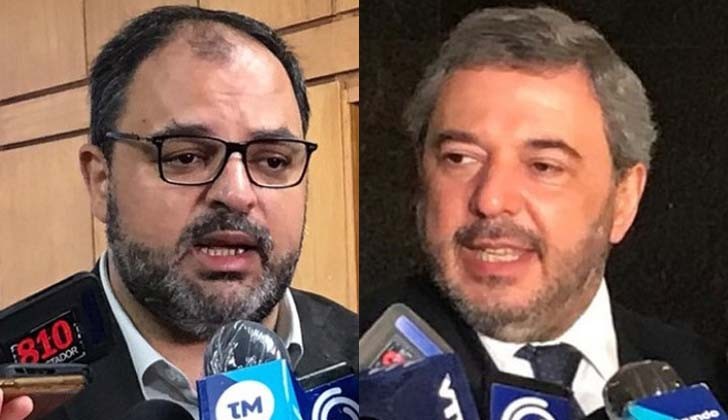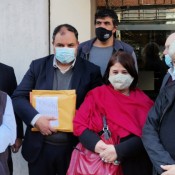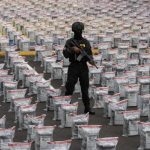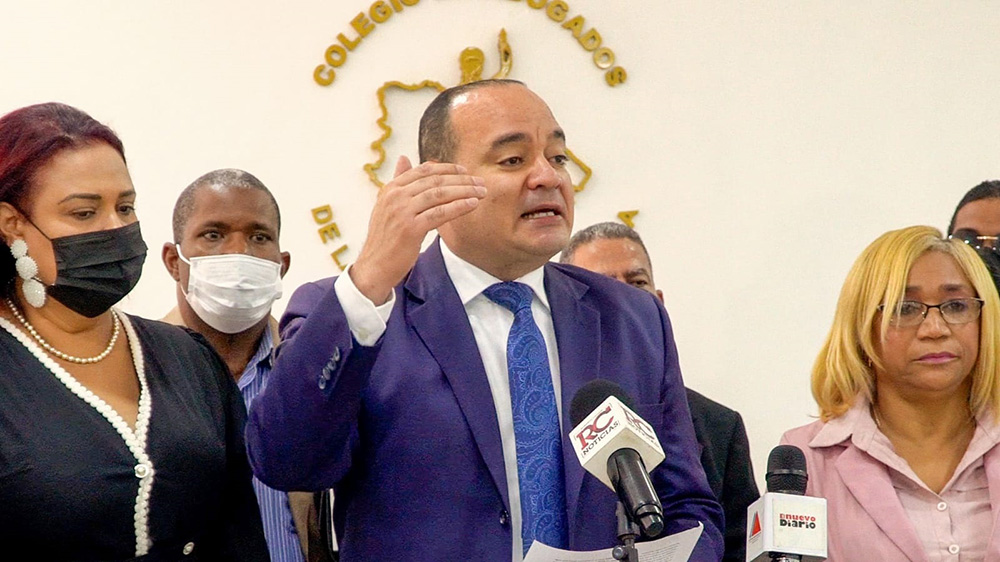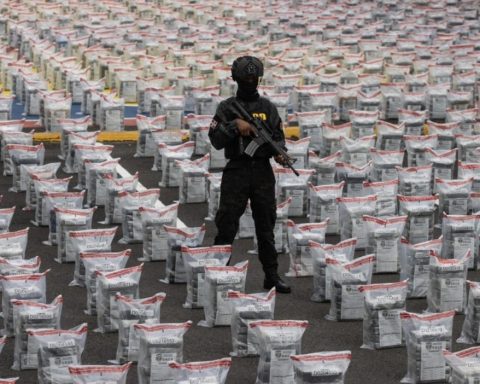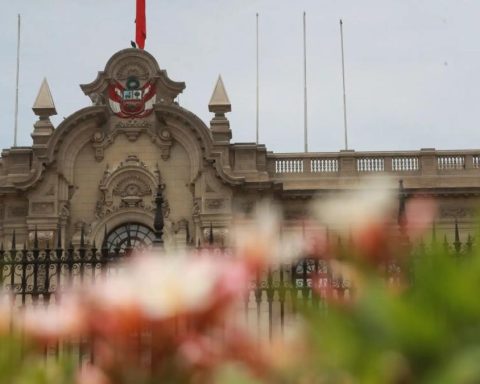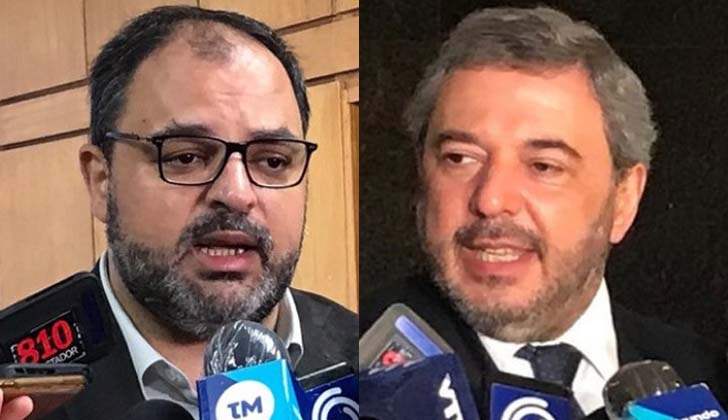
On September 29, the caucus of senators from the Broad Front had filed a criminal complaint against the Minister of Transportation, Luis Alberto Heber, before the Prosecutor’s Office for Economic and Complex Crimes; the undersecretary of the portfolio, Juan José Olaizola; the Secretary of the Presidency, Rodrigo Ferrés; and the president of the National Ports Administration (ANP), Juan Curbelo, for “irregularities and acts of criminal appearance” as a result of the extension of the concession of the Montevideo port terminal to the firm Katoen Natie.
This Wednesday, February 9, Senators Carrera and Bergara presented an extension of the criminal complaint.
The legislators denounce that with the Katoen Natie business plan “it is demonstrated that the thesis of exclusivity or monopoly in favor of Katoen Natie was a lie that was used to justify an arbitrary benefit.”
They indicated that this is the most important point of the extension of the complaint, because it is “further evidence that those involved, the representatives of the government and the company, never believed in the legal arguments used to justify the threat of trial and the preference (monopoly) in favor of the Cuenca del Plata Terminal”.
“This not only shows that they are wrong, but also that from the beginning they were aware that they are wrong,” they indicate in their complaint.
They also state that the business plan is one of the documents required from the buyer of TCP SA’s series A shares in the Terminal Management Regime decree. “Katoen Natie had to present it for having been the highest bidder in the 2001 auction.”
“We learned of the existence of the document after the criminal complaint was filed, we learned about it because Montecon introduced it in its annulment action before the Contentious-Administrative Court, which is a public file. The document was obtained by making a request for access to public information to the ANP”, indicate the parliamentarians.
They assert that the lawsuit with which KNG threatened was based on “the assertion that in 2001 it bought the concession with the expectation that it would enjoy a preference, priority or exclusivity (in reality, a monopoly) based on art. 72 of decree 183/1994. The claim was that this preference was never enforced.”
However, “when KNG formulated its business plan in 2001, not only did it ‘forget’ the existence of this commercial advantage that would multiply the value of its investment, but it also formulated its projections on the basis that it should compete equally of conditions with the operators of the public docks and with other future private terminals, whether they are specialized in containers or multipurpose”.
The FA indicates that “it can hardly now, 20 years later, claim to sue the State for not having asserted a preference that the company itself understood did not exist, in accordance with the business plan that it prepared at the time of acquiring the concession.”
They also assert that this document, which “could not be ignored by the company’s negotiators or by those of the government, constitutes one more irrefutable proof that the agreement with the KNG company and the decrees that consolidate it were drawn up with the knowledge of that the State did not face any risk of losing the litigation with which it was threatened and that KNG always knew that the legal regime enshrines free competition.”
The opposition parliamentarians understand that “it is also evidence that the negotiators knew that they were conferring illegal profits in the millions to a private company and even greater damage to other private companies, to the State and to the national economy.”
Denial
On the other hand, in their brief they refer to the fictitious denial by the State when it comes to answering the administrative appeals against the general regulation of ship berthing and the decree of the general management regime of the container terminal.
In this regard, three administrative appeals were filed against the general ship docking regulations (Decree 115/021) (in addition to those filed against the new general management regime for the container terminal (Decree 114/021). The first of them was presented by the Montecon company, the second by the Nobleza Naviera company and the third by the Single Port Union and Related Branches (SUPRA).
Said files “were not reported by any of the legal services of the State. Neither the lawyers of the ANP, nor those of the Presidency of the Republic, nor those of the Ministry of Transport and Public Works were issued in this regard.
In all cases, the files “end up being sent to the ANP” and the director of the legal entity stated that “it could not be issued because they did not participate in it.” From this point, the FA legislators arrive at “another indication of the illegality of the actions, because the administrative resources were not resolved by the hierarch and the fictitious denial has operated.”
The Broad Front understands that the mere fact of allowing the “ficta denial” to be configured configures a simple presumption against the State’s position in the face of a possible nullity action (Law 15,869 of 06.22.87, art. 6).
“There is no known history of appeals against administrative acts of a similar dimension in which the administration has allowed fictitious denial to be configured, which by itself implies the assumption of administrative responsibility by the omitted hierarchs”, express the legislators of left.
For this reason, they affirm that “it is necessary to find out the reasons why this was allowed to happen, in the absence of a sufficient explanation, the only reasonable hypothesis is that the illegality of the decisions is so flagrant that the hierarchs involved chose to incur in this omission , knowing that it is not possible to build any rational argument to support them”.
In another part of the complaint they refer to the “accidental” monopoly in favor of Obrinel SA (Terminal TGM) and the damage to the company Nobleza Naviera SA
They indicate that the Berthing regulation, whose text was included in the agreement includes an article (art. 11), says that the “concessioned terminals” (without clarifying what type of merchandise they handle) have preference over public docks.
They assert that this wording is probably due to the “argumentative strategy of the government and the company, which tried to make believe that the Ports Law assigned a subsidiary role to public docks.”
“The editors may not have realized that with that article they were not only generating a preference (monopoly) in favor of the TCP terminal, but also in favor of the TGM bulk terminal, owned by Obrinel SA”, they state.
In this context, they affirm that this “generated damage to another company, Nobleza Naviera SA, which is currently carrying out an action for annulment before the TCA.”
For the FA, suggestively, on February 3 the government tried to annul this “accidental” monopoly, issuing an “interpretative decree” that says that art. 11 only gives preference to container terminals. “However, art. 11 in its original wording is still in force and nowhere does it say that the preference only covers container terminals, so it is not clear if this is enough to deactivate this other monopoly.
The Executive Branch “was perfectly able to change the wording of art. 11”, assures the FA and asks, why didn’t he do it? “Possibly because the text of the berthing regulation was added in its entirety as an annex to the agreement and the government is not clear to what extent it can modify it without asking KNG for authorization. This is further evidence that government negotiators delegated regulatory powers that are their responsibility to a private company.”
On the other hand, they refer to the resolution of the Ministry of Economy and Finance of January 21, 2022 that “repeals resolution 220/021 of the Commission for the Promotion and Defense of Competition, which initiates the actions related to the complaint for practices anticompetitive presented by Montecon SA”.
“In an unprecedented event, the Ministry revoked a Commission resolution that the only thing it does is initiate an investigation as a result of a complaint, supposedly for lack of motivation. Unusually, the Ministry sets for the first time the precedent that the Commission must carry out an immediate analysis and pronounce itself outright as to whether a complaint received is within its sphere of competence, instead of completing the pertinent evidence before taking action. a decision about it.”
The FA assures that it is appropriate to investigate why the chief who made this decision, Cr. Alejandro Irastorza, “changed the administrative practice in this particular case, hindering the work of the Commission precisely in this case in which it was investigating a decision in which the Ministry itself was involved”.
“It is surprising that this investigation has been stopped for formal reasons. According to what has transpired, the investigation for actions contrary to free competition filed by Montecon against the government and Katoen Natie was well advanced and had more than 1,000 pages. In addition, during the past month the declaration of certain key witnesses presented by Montecon was scheduled. This revocation ends up taking the initiated investigation “to zero pages”, seeking to delay it or directly render it ineffective”, denounce the parliamentarians.
They affirm that this “goes against all the precedents established by the Commission itself and by the Ministry, since it is not a practice of the Commission to pronounce itself outright on whether or not a case is within its scope of action, but rather analyzes this aspect in the course of the proceedings, after having heard the arguments of the parties and completing evidence.
In this sense, they emphasize that with this “everything that the Commission had been doing until now was annulled.”
On February 1, the Commission resumed the investigation, and from the recitals it appears that “it does not agree with the arguments used by the MEF to annul what it had been carrying out.” For the purposes of the complaint, what is requested is that the actions of the Commission be forwarded to the Prosecutor’s Office.
